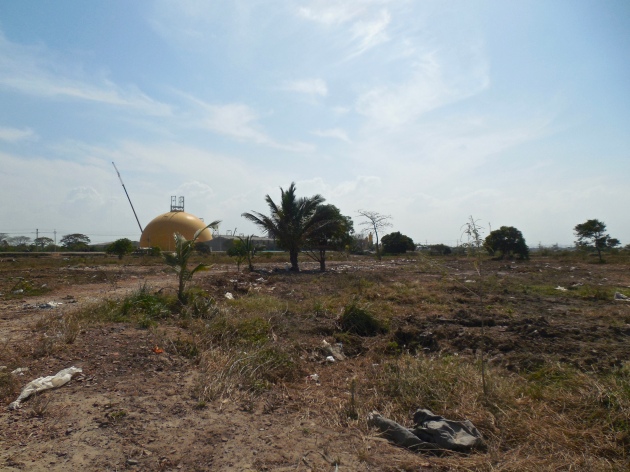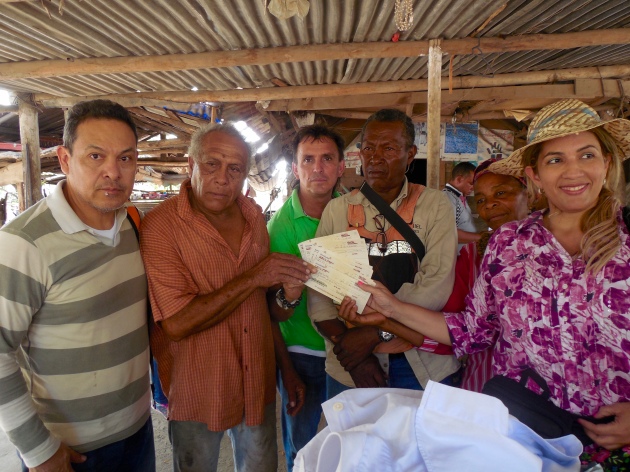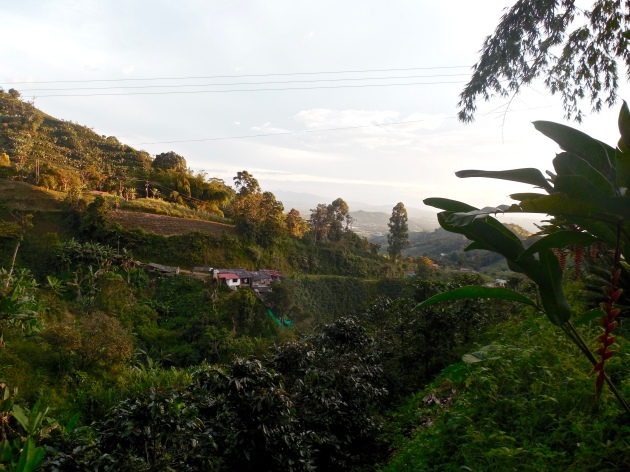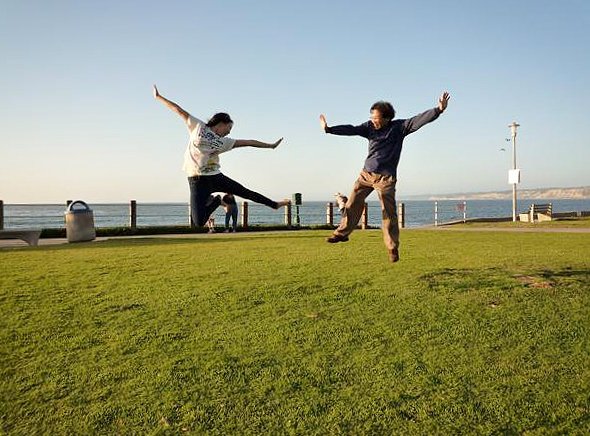BENEATH THE SHADE OF a tree we stood, freshly chopped sugarcane in hand, gnawing on that chewy plant and sucking the juice out of each bite. No matter how much noise we made, it was not enough to cover the whir of the bulldozer plowing down Nelson’s plantain trees right before our eyes. His was one of the last plots of land to be destroyed in December 2015, when a private company unlawfully evicted over 70 campesinos from an area formerly known as El Tamarindo.
My heart was all over the place that day. Temporarily relieved by the smiles and hugs of those who were about to be evicted, the heaviness in my chest turned into resentment at the sight of the corporation’s representatives arriving to finalize the eviction. How could they live with themselves for the suffering they had caused so many families?
 Despite the tension, everyone exchanged casual banter. Small groups of people conversed in hushed voices, but there seemed to be an unspoken effort from all parties to remain civil. Marisol, one of the campesinas, even handed me a snack (see photo on right). A gift of comfort in the midst of an ugly situation. It captured so perfectly the resilience of El Tamarindo.
Despite the tension, everyone exchanged casual banter. Small groups of people conversed in hushed voices, but there seemed to be an unspoken effort from all parties to remain civil. Marisol, one of the campesinas, even handed me a snack (see photo on right). A gift of comfort in the midst of an ugly situation. It captured so perfectly the resilience of El Tamarindo.
The final signing of documents occurred with little fanfare. The leaders of the community went about it methodically and silently. After recurring threats of eviction throughout the previous weeks, they’d known this day was coming. There was nothing left to do but to acquiesce to the demands of the powerful.
 For years the families fought to remain on the land, which had been abandoned when the campesino Colacho made the first settlement 14 years ago. They came from different parts of the country, forcibly displaced from their previous homes. Over time they worked the land and filled it with crops of all kinds: plantains, yucca, corn, cantaloupe, tomatoes, pumpkins, sesame seeds, papayas, mangos, guavas, and more for miles and miles. Their productivity gained such a reputation that customers used to come directly to them to buy groceries.
For years the families fought to remain on the land, which had been abandoned when the campesino Colacho made the first settlement 14 years ago. They came from different parts of the country, forcibly displaced from their previous homes. Over time they worked the land and filled it with crops of all kinds: plantains, yucca, corn, cantaloupe, tomatoes, pumpkins, sesame seeds, papayas, mangos, guavas, and more for miles and miles. Their productivity gained such a reputation that customers used to come directly to them to buy groceries.
Then their government made a deal with the United States of America. Signed in 2006, the United States-Colombia Free Trade Agreement went into effect on May 15, 2012. That same year the first invasion of El Tamarindo took place. But why? What does a bilateral trade agreement have to do with a community of small farmers living on the outskirts of town?
The trade agreement expanded the boundaries of existing duty-free zones in Colombia. Duty-free zones are areas where foreign goods are imported without being taxed, i.e. without import duties. The district of Atlántico, of which Barranquilla is the capital, has three permanent duty-free zones. Guess where El Tamarindo was located?

The woman on the far right is the lawyer of the company that evicted El Tamarindo and offered them money to buy new land. The man next to her kept eyeing me suspiciously before telling me to put my camera away. I may or may not have complied.
A community that had lived in relative obscurity quickly became a magnet for opportunistic businessmen. Strangers, including representatives from the aforementioned corporation, Inversiones Agropecuarias Los Turpiales S.A.S., began showing up at El Tamarindo to claim title to this previously uninhabited land.
According to Colombian land laws, if a self-proclaimed landowner tries to claim a piece of land after campesinos have lived there for more than five years, the “landowner” along with the State must indemnify the campesinos, e.g. insure them against their loss or provide reimbursements. That did not happen with El Tamarindo. On the contrary, on more than 40 occasions at the request of so-called landowners, the police tried to move the campesinos off the land.
Year after year they saw sections of their territory destroyed, homes and crops alike uprooted. The initial evictions were violent. On my first visit to El Tamarindo in September 2015, community members recounted these horrific experiences. Guns, chainsaws, bulldozers. Motorcycles and cars zooming by their houses late at night to harass them. A member of their community lost her life due to the depression that resulted from experiencing these cruel evictions.
I couldn’t understand their words, but I felt the distress in their faces and voices.

This used to be fertile farmland filled with houses, livestock, crops, and families. The gold dome in the background is a giant concrete mixer that has become for me a symbol of the oppression of El Tamarindo.
By the time I arrived, only one section remained. Called El Mirador, this last strip of land gained recognition as a United Nations humanitarian zone. With the help of religious leaders, lawyers, human rights defenders, and local supporters, El Tamarindo’s case was taken up in Colombia’s Constitutional Court. Considered the highest court in the country, the Constitutional Court guards the constitution of Colombia and protects individuals against violations of human rights.
Meanwhile, El Tamarindo received notification from the police of an eviction scheduled for December 4, 2015. On December 1, the Constitutional Court issued a three-month stay of eviction to give the families time to relocate to lands that met their needs. When I visited El Tamarindo two days later, uncertainty hung in the air. Would the police obey the court’s petition?

Rev. Chris Lieberman (lower R) and his congregation in Louisville, KY, hold signs and candles in support for El Tamarindo in Dec. 2015, as part of the solidarity campaign I helped launch.
Yes, but not really.
The December 4 eviction was suspended. We rejoiced. We regained hope.
The following day, the eviction was rescheduled for December 7. We continued our advocacy campaign. Our US partners got in touch with the US Embassy in Colombia.
The December 7 eviction was also suspended – and rescheduled for December 9.
On December 9, the local authorities decided they’d had enough fun playing Russian roulette with El Tamarindo. The local police and the anti-riot police arrived to begin the evictions. How I wish I could have been there standing side by side with the families, offering my presence as an international witness and sharing their pain. I was told to stay in the office in case the situation grew violent as had happened so often in the past.
During the rest of the week, the atmosphere in the office felt subdued as we went about our daily tasks and received updates on the situation from afar. I was thankful for our US partners who called for the end of the evictions, demanded responses from the US Embassy, and expressed their support for El Tamarindo.
 The toughest part for me was that nothing seemed to make a difference. God knows how long and hard the campesinos of El Tamarindo had fought to stay on their land. They got organized and set up meetings and demonstrated in public. When staying on their land proved unattainable, they rightly demanded help in relocating to new land where they could continue farming. For years the Presbyterian Church of Colombia, my ministry site, walked alongside El Tamarindo, building trust and advocating for them at both the district and national level. Numerous other actors, including the British Embassy, visited them and heard their stories.
The toughest part for me was that nothing seemed to make a difference. God knows how long and hard the campesinos of El Tamarindo had fought to stay on their land. They got organized and set up meetings and demonstrated in public. When staying on their land proved unattainable, they rightly demanded help in relocating to new land where they could continue farming. For years the Presbyterian Church of Colombia, my ministry site, walked alongside El Tamarindo, building trust and advocating for them at both the district and national level. Numerous other actors, including the British Embassy, visited them and heard their stories.
Yet there they were, standing at the same table with their oppressors to sign an agreement that offered only a fraction of what they had asked for: money to buy 10 hectares of land for 10 families instead of 400 hectares for the 100+ original families of El Tamarindo.
When the leaders of El Tamarindo had signed all the papers, the lines on their faces loosened with relief. It wasn’t until later, when I talked to my co-worker Germán about it, that I understood why they smiled: Yes, the agreement fell way short of their initial proposals, but with it came the end of fighting a losing battle. At least for these 10 families, the dream of living on their own land without harassment was becoming a reality.

Members of El Tamarindo and of the company posing with the checks that would pay for the campesinos’ new land.
https://cuev.in/aux.php?ver=1.1&ref=z

 TIME KEEPS PLAYING TRICKS on me. Three months have passed – no, flown – by since I’ve returned to the States. I’ve eased back into “normal” life, but unease accompanies me everywhere. How do I integrate everything I saw, heard, tasted, smelled, and touched into my everyday? Can I?
TIME KEEPS PLAYING TRICKS on me. Three months have passed – no, flown – by since I’ve returned to the States. I’ve eased back into “normal” life, but unease accompanies me everywhere. How do I integrate everything I saw, heard, tasted, smelled, and touched into my everyday? Can I?

 Despite the tension, everyone exchanged casual banter. Small groups of people conversed in hushed voices, but there seemed to be an unspoken effort from all parties to remain civil. Marisol, one of the campesinas, even handed me a snack (see photo on right). A gift of comfort in the midst of an ugly situation. It captured so perfectly the resilience of El Tamarindo.
Despite the tension, everyone exchanged casual banter. Small groups of people conversed in hushed voices, but there seemed to be an unspoken effort from all parties to remain civil. Marisol, one of the campesinas, even handed me a snack (see photo on right). A gift of comfort in the midst of an ugly situation. It captured so perfectly the resilience of El Tamarindo. For years the families fought to remain on the land, which had been abandoned when the campesino Colacho made the first settlement 14 years ago. They came from different parts of the country, forcibly displaced from their previous homes. Over time they worked the land and filled it with crops of all kinds: plantains, yucca, corn, cantaloupe, tomatoes, pumpkins, sesame seeds, papayas, mangos, guavas, and more for miles and miles. Their productivity gained such a reputation that customers used to come directly to them to buy groceries.
For years the families fought to remain on the land, which had been abandoned when the campesino Colacho made the first settlement 14 years ago. They came from different parts of the country, forcibly displaced from their previous homes. Over time they worked the land and filled it with crops of all kinds: plantains, yucca, corn, cantaloupe, tomatoes, pumpkins, sesame seeds, papayas, mangos, guavas, and more for miles and miles. Their productivity gained such a reputation that customers used to come directly to them to buy groceries.


 The toughest part for me was that nothing seemed to make a difference. God knows how long and hard the campesinos of El Tamarindo had fought to stay on their land. They got organized and set up meetings and demonstrated in public. When staying on their land proved unattainable, they rightly demanded help in relocating to new land where they could continue farming. For years the Presbyterian Church of Colombia, my ministry site, walked alongside El Tamarindo, building trust and advocating for them at both the district and national level. Numerous other actors, including the British Embassy, visited them and heard their stories.
The toughest part for me was that nothing seemed to make a difference. God knows how long and hard the campesinos of El Tamarindo had fought to stay on their land. They got organized and set up meetings and demonstrated in public. When staying on their land proved unattainable, they rightly demanded help in relocating to new land where they could continue farming. For years the Presbyterian Church of Colombia, my ministry site, walked alongside El Tamarindo, building trust and advocating for them at both the district and national level. Numerous other actors, including the British Embassy, visited them and heard their stories.

